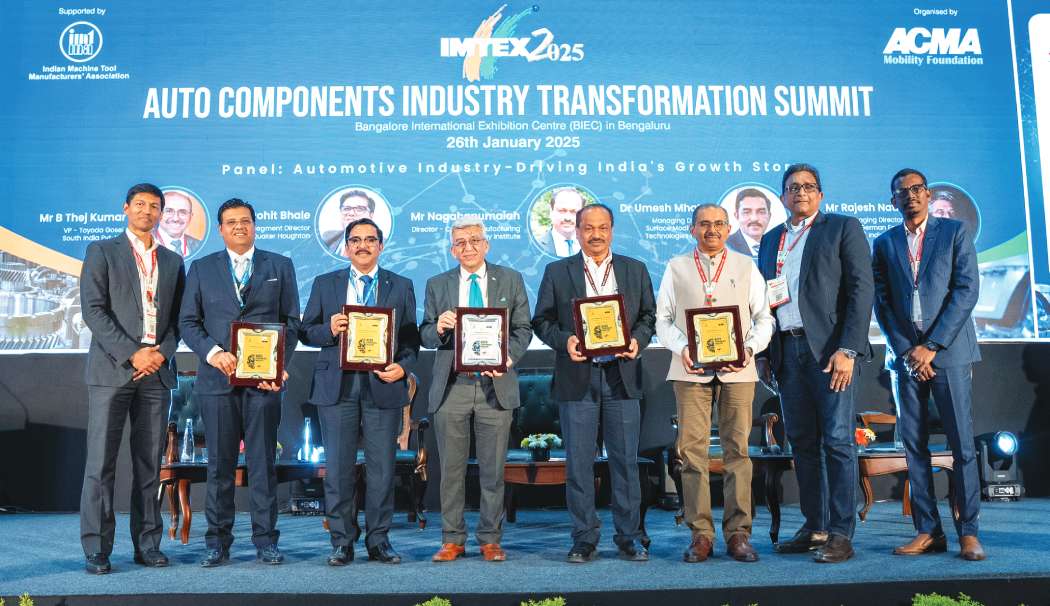CRAFTING THE FUTURE OF MOBILITY

Organized by ACMA (Automotive Component Manufacturers Association of India) Mobility Foundation and Indian Machine Tool Manufacturers’ Association (IMTMA), ‘Auto Components Industry Transformation Summit’ on January 26 at Bangalore International Exhibition Centre (BIEC), during IMTEX 2025, served as a crucial platform for navigating the evolving landscape of auto components manufacturing.
The high-profile gathering united thought leaders from OEMs, Tier 1 companies, and cutting-tool innovators and inspired a dynamic exchange of ideas and solutions to combat critical challenges the Auto Components industry faces in its journey towards machining excellence.
A star-studded panel discussion on ‘The Auto Components Industry Driving India’s Growth’ was held under the skilled moderation of Rajesh Nath, Managing Director, German Engineering Federation (VDMA) India Office. The panelists included Dr Umesh Mhatre, Managing Director, Surface Modification Technologies Pvt Ltd; Nagahanumaiah, Director, Central Manufacturing Technology Institute; Rohit Bhale, Director, Business Segment, Quaker Houghton; and B Thej Kumar, Vice President, Toyoda Gosei South India Pvt Ltd.
A Fireside Chat with industry leaders on ‘Analysis of India’s Position in the Global Automotive Components Manufacturing Landscape’ featured Sriram Viji, Managing Director, Brakes India Pvt Ltd and Chairman, ACMA Southern Region; Prashanth Doreswamy, President & CEO, Continental Automotive Components (India) Pvt Ltd; and Nath.
Call for a Collaborative Approach
Mani, in his keynote address, highlighted that the Indian Automotive Manufacturing industry is undergoing a significant transformation, driven by global trends. He emphasized the need for component redesign, with future components required to be lighter, tougher, and equipped with improved surface treatments to reduce friction. This shift, he noted, demands rapid innovation in production processes to align with evolving industrial requirements.
He further stressed that the Machine Tools industry will play a pivotal role in facilitating the production of these next-generation components in a smooth, economical, and globally competitive manner. Mani underscored the importance of a collaborative approach to enhance the quality of both products and production machinery, ensuring the creation of components that meet global standards at the most cost-effective rates.
Echoing his sentiment, Nath highlighted the pivotal role of collaboration between the Machine Tools and Auto Components industries in shaping India’s manufacturing future. “The Automotive, Auto Components and Machine Tool sectors have a synergy effect because the Auto Components sector is highly dependent on the Machine Tools sector,” he noted.
He emphasized the transformational impact of this relationship, noting that the Automotive industry contributes nearly 7 percent to India’s GDP and almost 49 percent of the manufacturing GDP.
“With India’s endeavor to become a US $5 trillion economy and the Manufacturing industry to contribute about US $1 trillion to it, the Machine Tools sector, I believe, will play a very important role in India’s growth story,” he added.
| The high-profile gathering united thought leaders from OEMs, Tier 1 companies, and cutting-tool innovators and inspired a dynamic exchange of ideas and solutions. |
For Stronger Industry Partnerships
Doreswamy too shared an insightful perspective on India’s manufacturing rise and the critical role of the Auto Components sector in shaping the nation’s economy, “The Automotive sector is one of the biggest employers and employs around 35 million people. There is a huge transformation currently underway in the Automotive sector – be it in electrification, convenient features, safety features or the shared mobility.
“Fifty-five percent of the machines which Indian tool makers make is consumed by the Automotive and with more factories getting automated, it is even more essential that we partner with IMTMA even more strongly to make our shopfloors with this digitized work much more efficient. For that, we are looking forward to have a close partnership with IMTMA and look forward to see and adopt many more innovations which could be used in our shopfloors.”
“The future of manufacturing is smart, and together, we can accelerate this journey,” he noted, underscoring the need for stronger industry partnerships and adoption of next-gen technologies.
Painting a vivid picture of an industry on the brink of a remarkable transformation, Viji stated, “The Auto Components industry isn’t just a segment; it’s the backbone of India’s manufacturing ecosystem.”
He added, “The Auto Components industry is the big contributor to the manufacturing segment of India – to both employment as well as the GDP of the country. The industry has experienced significant growth over the past several years. Today, it generates revenue exceeding INR 6.1 lakh crore and is also a significant contributor to exports from India. Over 25 percent of the total sales is in exports.”
He emphasized that this isn’t about incremental changes but a full-scale revolution. With exports contributing over 25 percent of total sales, the Indian Auto Components industry, he added, is rapidly shifting gears and making its mark
on the global stage. “We’re not just manufacturing,” he explained, “we’re crafting the future of mobility.”
“The partnership between ACMA and IMTMA has been a long standing one but this edition of the conference is relatively new. We hope that the Indian Machine Tools industry will grow along with ACMA and work hand in hand to develop the next generation of solutions whether it be the next set of machine tools or automation or Industry 4.0 offerings for the industry,” he further added.
Commending the Initiative
The participants at the summit lauded the initiative taken by IMTMA and ACMA. “The summit is a great platform to unite stakeholders from ACMA India and IMTMA,” said Nath.
With IMTEX 2025 hosting 1,200 exhibitors, he pointed out that it’s not just an exhibition but a meeting point for global manufacturers and Indian players to exchange ideas and showcase technologies. “It’s a fantastic opportunity for Indian manufacturers to see the latest innovations and understand global trends,” he added.
Viji noted with optimism, “Our aim is to make India’s Auto Components industry world-class, leveraging localized innovations and collaborative expertise.” The summit stands as a testament to India’s bold ambition to shape a sustainable and globally competitive automotive future.
Thanking Modern Manufacturing India magazine, Nath concluded with a call to action: “Let’s be a part of India’s growth story and take the nation forward as we work towards the vision of Viksit Bharat 2047.” His remarks reinforced the summit’s purpose: fostering innovation, collaboration, and progress in India’s Automotive and Manufacturing sectors.
 |
Poonam Pednekar |




 Facebook
Facebook.png) Twitter
Twitter Linkedin
Linkedin Subscribe
Subscribe